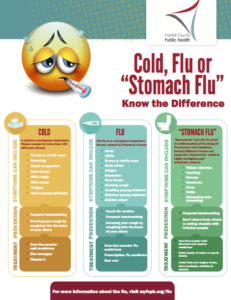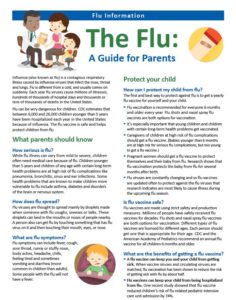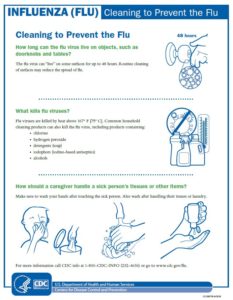What is the Flu?
Influenza (also known as the flu) is a contagious respiratory illness caused by flu viruses. It can cause mild to severe illness, and at times can lead to death in infants, the elderly and those with other illnesses where the immune system in the body is not strong enough to fight the virus.
Importance of Getting a Flu Shot
While the flu shot will not protect you from COVID-19, seasonal flu is also a respiratory virus that is circulating throughout our community along with COVID-19. It’s important to reduce your risk of a possible co-infection with both viruses, which may increase the severity of the other illness should you get sick with both at the same time. There is also the possibility that being sick with one will weaken your immune system, and increase your chances of getting the other illness.
The best way to prevent the flu is to get a flu shot. Everyone 6 months of age and older should get a flu shot every year. Vaccination is particularly important for people who are at high risk of serious complications from influenza.
We offer flu shots at our regular monthly immunization clinics. Click here to schedule an appointment at one of our clinics or call (614) 525-3719. You can also use the CDC's flu shot finder to find a flu shot clinic near you.
Cold, Flu or "Stomach Flu"?
Flu season brings the influenza virus as well as common colds and sometimes the "stomach flu." These illnesses start to increase as persons spend more time inside in close proximity to others but do you know the difference between the illnesses? The flyer to the right explains the similarities and differences in symptoms and prevention and treatment methods. (Click on the image for a printable flyer.)
Is it Flu or COVID-19?
COVID-19, flu, and the common cold have many similarities but there are some important differences too. Always contact your health care provider if you are sick enough that you may need care or to see if you should be tested for COVID-19.
Learn the difference between COVID-19, flu and a cold by visiting covid-19.myfcph.org.
Flu and Cold Season Tips
Be sure to protect yourself and your loved ones during cold and flu season by following these tips:
This is the single best way to protect against the flu. Everyone 6 months of age and older is encouraged to get vaccinated every year. Flu season in Ohio normally peaks in January or later. Flu shots are widely available throughout the community.
Since your hands are the most common way to get germs into your body, you should scrub vigorously with soap and water for 10-15 seconds to keep them as germ-free as possible. Wash after using the bathroom, before handling food, before eating, and any other time you think you might have picked up germs. Additional information on hand washing.
You can't keep all the germs off your hands all the time. So, keep your hands away from germs' most common entryways into the body.
Stop the spread your germs to others by coughing or sneezing into your sleeve instead of your hand or into the air.
Get plenty of sleep, drink plenty of fluids, eat nutritious foods, manage your stress, and be physically active. Be sure to follow the safety guidelines for COVID-19.
Frequently Asked Questions
You may have the flu if you have some or all of these symptoms:
- Fever*
- Cough
- Sore throat
- Runny or stuffy nose
- Body aches
- Headache
- Chills
- Fatigue
- Sometimes diarrhea and vomiting
*It's important to note that not everyone with flu will have a fever.
Contact your healthcare provider to see if you should be tested for COVID-19.
Most people with the flu have mild illness and may not need medical care or antiviral drugs. If you get sick with flu symptoms, you should stay home and avoid contact with other people except to get medical care, if needed.
Your doctor may prescribe antiviral drugs that can treat the flu. These drugs work better for treatment the sooner they are started.
You should stay home for at least 24 hours after your fever is gone except to get medical care or other necessities. Your fever should be gone without the use of a fever-reducing medicine, such as Tylenol®.
Stay away from others as much as possible to keep from infecting them. You should stay home from work, school, travel, shopping, social events, and public gatherings. Always cover coughs and sneezes with a tissue. Wash your hands often to keep from spreading flu to others. Follow the safety guidelines for COVID-19.



